 |
|
|
 |
 |
 |
Breed Profile
--Written By Janet Legg
 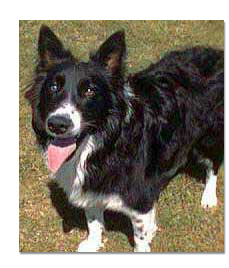
Breed: Border Collie
Owner Level:
Experience, active and highly involved.
Owners should have extensive dog-owning experience prior to adopting a Border Collie. Obedience training skills are also highly recommended, as is the ability to be a firm yet fair disciplinarian. A Border Collie owner's physical activity level should be very high as these dogs require lots of daily (every single day) exercise to remain healthy, happy and content.
This breed can be a challenge to those who underestimate their need for exercise and training. Being highly intelligent does not mean that the dogs are always easy to live with. The dogs are NOT born trained as actors in movies nor advertisements - owner commitment to training is needed. Please visit the websites we have listed under MORE RESOURCES before considering the Border Collie as your pet.
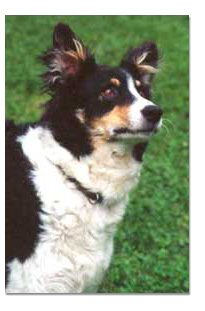 Average Height: Average Height:
17" to 23" average
Average Weight:
A medium-sized dog, they tend to average between 30 to 55 pounds.
Average Life Span:
12 to 16 years is common
Color And Coat:
Colors include: Black & white, Red & White, Black Tri-color, Red Tri-color, Sable, and Blue Merle. Purebred Border Collies can also be one solid color. Coat varies from short/smooth/close to the body - to long/feathered/perhaps wavy or curly - and everything in-between. Most coats are water-repellent and easy to clean.
Grooming
Minimal grooming is required. Due to relatively short coats and little-to-zero undercoat, the Border Collie stays relatively clean. Occasional bathing, toenail trimming and brushing would be needed. The Border Collie does not require shaving nor trimming of coat. The athletic Border Collie thinks nothing of running through deep muddy pools or laying down in them.
Typical Health Problems:
Genetic health disorders which can occur occasionally in Border Collies include: Collie Eye Anomaly (CEA), Progressive Retinal Atrophy (PRA), Canine Hip Displasia, seizures, hyperthermia. Accidental injuries are common due to high-speed athletic activities.
History and Personality:
History and Personality:
The Border Collie was originally bred many years ago in the border country between Scotland and England as a working dog for sheep ranchers. Today the Border Collie remains a working machine who can maintain control over sheep for many hours or days at a time. Although the Border Collie is bred for its abilities and natural herding instinct rather than for appearance, they were officially recognized by the American Kennel Club in 1994 and are now allowed to compete in conformation classes (for AKC Championships). The Border Collie is an extremely intense breed of dog that can control the movement of sheep by simply using his "eye". The eye-lock stare can look very intimidating.
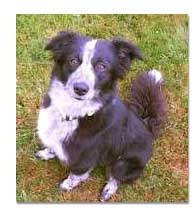 Border Collies are wonderful, simply incredible. They are very wise souls who can look at your face and get into your head, know what you are thinking. They are sensitive and can get their feelings hurt easily, pouting for hours. They are affectionate dogs, known to truly hug their owners. They are playful and adore their toys, asking you to join them for a game. They enjoy traveling, swimming and watching television or simply being close to their people. Although they can run at the speed of light for long periods of time, they also can settle down quietly at your feet inside the house. Border Collies are wonderful, simply incredible. They are very wise souls who can look at your face and get into your head, know what you are thinking. They are sensitive and can get their feelings hurt easily, pouting for hours. They are affectionate dogs, known to truly hug their owners. They are playful and adore their toys, asking you to join them for a game. They enjoy traveling, swimming and watching television or simply being close to their people. Although they can run at the speed of light for long periods of time, they also can settle down quietly at your feet inside the house.
Generally, Borders get along well with other dogs and family pets, pay close attention to their owners, and tend to stay home (unless bored, ignored and frustrated). They are an exceptionally versatile dog breed which can compete in dog sports, perform many dog tricks, retrieve like a Labrador, point like a Setter, swim like a fish, assist as a Search & Rescue Team member, as well as join owners as an enthusiastic hiking/jogging/camping/boating partner.
Most Border Collies are highly sight and sound sensitive - they see and hear things we would certainly overlook. They often exhibit quirky behaviors observing shadows, moving lights, flying bugs, air movement, vacuum cleaner, hair dryer, toaster sounds, rustling tin foil, a human cough or sneeze, baby crying, laughing, thunder & lightening, gunshots and fireworks... to mention a few. They are known to react to sights and sounds by cowering, hiding, jumping, aggressing... or just acting weird. Border Collie lovers learn to accept these typical quirks as part of their charm and personality, even if not preferred. Border Collies require lots of socialization and training to avoid becoming overly property and family protective.
Why are these dogs typically in animal shelters?
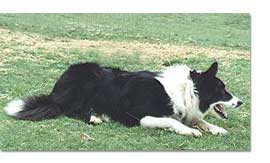 Although some Border Collies end up in shelters as stray or lost dogs, many are owner-relinquished due to "lack of time" and the inability to meet the dog's emotional and physical needs. Other reasons include: behavior problems, owner moving, family allergies, new baby, teenager going to college, etc. Owners who neglect a Border Collie's high demand for regularly daily exercise can expect noticeable behavior problems (digging, chewing, barking, escaping yards, household destruction) so a commitment to off-leash running for at least 2 hours a day is needed. A gentle walk around the neighborhood is inadequate for most Border Collies. Obedience, manners and other training is absolutely necessary. Although some Border Collies end up in shelters as stray or lost dogs, many are owner-relinquished due to "lack of time" and the inability to meet the dog's emotional and physical needs. Other reasons include: behavior problems, owner moving, family allergies, new baby, teenager going to college, etc. Owners who neglect a Border Collie's high demand for regularly daily exercise can expect noticeable behavior problems (digging, chewing, barking, escaping yards, household destruction) so a commitment to off-leash running for at least 2 hours a day is needed. A gentle walk around the neighborhood is inadequate for most Border Collies. Obedience, manners and other training is absolutely necessary.
How do these dogs handle shelter
life?
Shelter confinement is difficult for and stressful on the Border Collie, as well as most "herding" breeds. Since Borders are exceedingly sensitive to sights and sounds, the shelter environment can create serious depression or anxiety-ridden behavior. You may see a Border Collie stay way back in the shelter run or curled up in a tight ball (if depressed) as he tries to hide from the activity and noise. Or you may see an agitated Border Collie leaping anxiously at the kennel gate while behaving desperate or even aggressive. Behavior and attitude usually improves once removed from a shelter.
Border Collies form strong bonds and attachments with new owners, adjusting quickly to new homes and routines. It is important not to set expectations and demands too high on a recently adopted dog. Take time for any dog to settle in before beginning a strict training regime.
Who should own this breed?
People who love outdoor activities and regular daily exercise would love a Border Collie. If you enjoy teaching a dog amazing new tricks on a regular basis, you would be one very entertaining Border Collie owner. If you would like extreme devotion, affection and attention from your dog, the Border Collie is for you. If, on the other hand, you live a quiet sedentary lifestyle, don't want to be bothered with tossing the ball every day or teaching new tricks to your dog, and installed new white carpeting you wish to remain unstained, FORGET owning a Border.
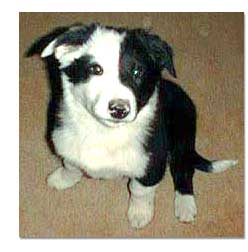 Is this breed good with children? Is this breed good with children?
Border Collies are NOT recommended for children under 12 years of age. Due to the natural behaviors of this intense breed, children can become targets of the Border Collies' instinct to herd. Running, playing, yelling children can easily get bitten as the dog attempts to control the activity. This breed can become overly protective of family members if not trained and socialized properly.
Is this breed good with other dogs in general?
YYes. Border Collies generally get along very well with other dogs. They tend to pay little attention to unfamiliar dogs, preferring to interact more their owner. They usually get along nicely living in multiple-dog homes.
How easy is training and housetraining with this breed?
The Border LIVES for training and is very receptive to any new command. They excel at agility, fly-ball, obedience, tracking, fetching, Frisbee toss, and sheep herding (surprisingly there are many sheepdog trainers in Washington & Oregon). An untrained/ignored Border Collie will become frustrated and bored resulting in problematic behaviors.
The Border Collie house trains quickly. Even dogs that have spent years strictly outdoors have become wonderful house pets. Like any dog, the Border Collie can be destructive if left alone loose indoors unsupervised. Crating or kenneling is a good preventative and can help with house training. |
|

